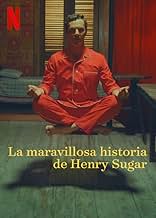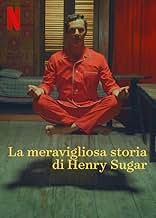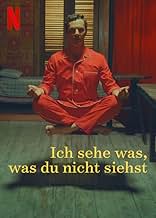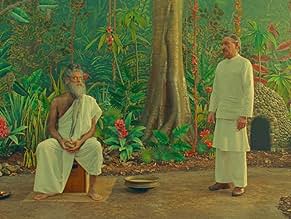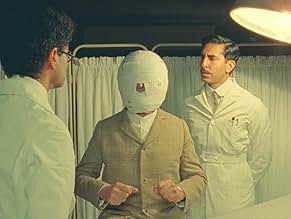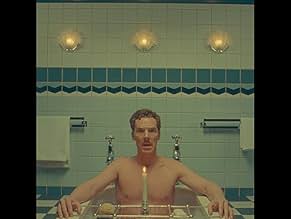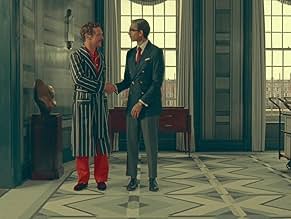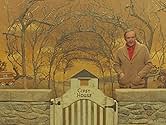La maravillosa historia de Henry Sugar
Crónica de una variedad de historias, pero la principal sigue a Henry Sugar, quien puede ver a través de los objetos y predecir el futuro con la ayuda de un libro que robó.Crónica de una variedad de historias, pero la principal sigue a Henry Sugar, quien puede ver a través de los objetos y predecir el futuro con la ayuda de un libro que robó.Crónica de una variedad de historias, pero la principal sigue a Henry Sugar, quien puede ver a través de los objetos y predecir el futuro con la ayuda de un libro que robó.
- Dirección
- Guionistas
- Elenco
- Ganó 1 premio Óscar
- 1 premio ganado y 2 nominaciones en total
- Casino Guest
- (as Christopher Long)
- Dirección
- Guionistas
- Todo el elenco y el equipo
- Producción, taquilla y más en IMDbPro
Opiniones destacadas
This isn't a full-blown comedy, but it certainly doesn't shy away from its share of wry humor. The script sprinkles witty quips and playful moments throughout the tale, giving the audience some delightful chuckles. It's a nod to Anderson's signature style - a dash of quirkiness that keeps you grinning.
Benedict, in his first foray into Anderson's cinematic world, shines as Henry Sugar. His portrayal adds depth to this peculiar character, and he's complemented by a stellar supporting cast who bring their own unique flair to the story.
"The Wonderful Story of Henry Sugar" exudes a distinct theatrical vibe. The set design and the way the scenes are presented feel like a live theater performance. It's a refreshing departure from the conventional cinematic experience, adding a layer of whimsical charm.
This film doesn't aim to tug at your heartstrings or deliver profound messages; it's here to entertain. It's a bedtime story for the child in all of us, a light-hearted adventure that captivates without overwhelming.
In true Wes Anderson fashion, "The Wonderful Story of Henry Sugar" dances to its own whimsical tune, making it a delightful short film that transports you to a world where the ordinary becomes extraordinary.
And whilst it is different, people tend to start agreeing with extreme ratings: i.e. They either say they like it very well and give it a rating of 10 stars, or they hate it and go for a 1 star rating. And since I do not want my review being tainted by chosing either of the two camps, I simply chose to not give it an IMDb rating. This so that either camp can agree with my review instead of a rating...
That this is some new type of content is obvious. I personally think it is more a natural evolution of (1) reading books, to (2) audiobooks, and now (3) this new format.
I think a term of "cinematic book" may fit with what we see here: a book that is read to an audience by using renowned actors in a format that fits cinema.
With many new things, I was confused at what exactly I was watching when I started this content. And honestly said, it took me several minutes to adjust to it. As an avid bookreader myself, I have enjoyed quite a number of Roald Dahl's books. Not being a fan of audiobooks myself, I never ever listened to his books. But this "cinematic book" is just a different experience. There is so much added richness to it, that I really started to enjoy it. So rich actually, that I had trouble keeping up with the fast-paced storytelling. There is so much to see in each of the different sets that it is pretty difficult to ingest all you hear and see. And I think this will be even a bigger challenge for viewers from non-english speaking countries which need to rely on subtitles. So, I think it may be a recommendation to (1) first "watch" it with a primary focus on listening to the story, and (2) a second time to enjoy the richly detailed scenes.
Concluding, I think we witness here the evolution of how we may "read" books. An evolution that first started with the introduction of audiobooks, which we now see evolve in a content genre that I can describe best as a "cinematic book". And whilst it takes some moments to get used to, I definitely want to see more of it in the future.
So this seemed to be a sort of first person narrative where the characters speak the story themselves? Think of it when a person reads a book out loud at home, but in this case they are reading to us the viewers.
The story of this piece focused on various qualities of generosity and depthful feelings. It was interesting to see the characters describe their feelings while not showing any type of emotions. Due to the nature of this film, I wasn't sure what to think, the concept is good but I found it perplexing.
My only issue is the pacing, I am unsure if this was on purpose or not. This flim piece moved way too fast, to where even I had trouble keeping up or understanding what was going on. Perhaps this is how the film was designed to be or I needed a deeper level of understanding?
¿Sabías que…?
- TriviaIn a 2023 interview with Deadline, Wes Anderson spoke about how Ralph Fiennes got into the character of Roald Dahl: "In our house, we have a recording of Dahl reading Fantastic Mr. Fox. He did record himself doing quite a few of [his books]. There's also a reasonable amount of documentary stuff about Dahl. In fact, when we started filming Henry Sugar, Ralph was on set, in the little space that's a recreation of Dahl's workspace, and I could hear him talking to himself. I said, 'Tell me what you're saying.' It turned out that he'd been observing Dahl from the archival stuff I'd sent him, and he knew Dahl's little rituals. He was acting them out on his own, just in preparation. And I was like, 'Start over, start over! We'll film this!' And so, the movie begins with Ralph completely improvising. Every take was a bit different, because it's Ralph just sort of channeling Dahl getting ready to write. Ralph is so interesting and authentic."
- ErroresStarting around 22:00 as the cuts go back and forth between front angle cuts and side angle cuts; the orientation of how Roald Dahl is holding the cigarette changes.
- Citas
Imdad Khan: Audiences loved it, but no one ever ever believed it to be genuine. Still don't. Even doctors, such as yourself, who blindfold me in the most expert fashion, refuse to believe anyone can see without his eyes. They forget there are other ways of sending an image to the brain.
Dr. Chatterjee: What other ways?
Imdad Khan: Quite honestly, I do not know.
- ConexionesEdited into La maravillosa historia de Henry Sugar (2024)
- Bandas sonorasCosi Fan Tutte, K. 588, Act I Scene 2: No. 10, Terlettino Soave Sia il Vento (Dorabella, Don Alfonso, Fiordiligi)
Written by Wolfgang Amadeus Mozart
Arrangement by Jonathon Rathbone
Performed by The Swingles
Courtesy of Erato/Warner Classics, Warner Music UK Ltd
By arrangement with Warner Music Group Film & TV Licensing
Selecciones populares
Detalles
- Fecha de lanzamiento
- Países de origen
- Sitios oficiales
- Idioma
- También se conoce como
- The Wonderful Story of Henry Sugar
- Locaciones de filmación
- Productoras
- Ver más créditos de la compañía en IMDbPro
- Tiempo de ejecución40 minutos
- Color
- Mezcla de sonido
- Relación de aspecto
- 1.33 : 1
Contribuir a esta página



